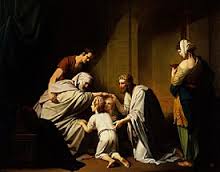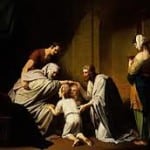Moshe Kempinski
Joseph brings his two sons to receive a blessing from his ailing father Jacob. His father prefaces the blessing with the following words;
“So he blessed them on that day, saying, “Thusly , Israel shall bless, saying, ‘May God make you like Ephraim and like Menasheh,’ ” (Genesis 48:20)
To this very day when parents bless their sons they declare the following;
May G-d make you like Ephraim and like Menasheh.
May G-d bless you and watch over you.
May G-d shine His face toward you and show you favor.
May G-d be favorably disposed to you and grant you peace.
( When blessing the daughters, the Priestly blessing is prefaced with the words May G-d make you like Sarah, Rebecca, Rachel and Leah.)
What is it about Ephraim and Menasheh that evoked this declaration by Jacob? More dramatically, what can be learnt from the fact that Jacob placed his right hand over the younger son Ephraim and the left over the eldest, Menasheh?
“And Joseph took them both, Ephraim at his right, from Israel’s left, and Menasheh at his left, from Israel’s right, and he brought them near to him. But Israel stretched out his right hand and placed it on Ephraim’s head, although he was the younger, and his left hand [he placed] on Menasheh’s head. He guided his hands deliberately, for Menasheh was the firstborn. “(Genesis 48:13-14)
Joseph becomes very concerned. It was not the change in protocol that concerned him but rather the fact that it is exactly this type of preference for the younger son that has vexed and plagued this family so deeply. Abraham chooses Isaac and Isaac eventually chooses Jacob. Jacob himself shows what seemed to be preference for Joseph and the dramas that were set in to motion continue to reverberate to our very day.
And Joseph saw that his father was placing his right hand on Ephraim’s head, and it displeased him. So he held up his father’s hand to remove it from upon Ephraim’s head [to place it] on Menasheh’s head. And Joseph said to his father, “Not so, Father, for this one is the firstborn; put your right hand on his head.” (ibid 48:17-18)
Yet Jacob is unmoved and declares, “I know, my son, I know; he too will become a people, and he too will be great. But his younger brother will be greater than he, and his children’s fame will fill the nations.” (ibid 19).
What then are the special qualities of Ephraim and Menasheh that evoked the statement “Israel shall bless, saying, ‘May God make you like Ephraim and like Menasheh,’ “
Ephraim and Menasheh were the first two children to be born into the exile of Egypt. Joseph gives them names that echoed his experiences but would also reveal the strengths necessary for survival in the midst of exile.
And to Joseph were born two sons before the year of the famine set in, whom Osnat the daughter of Poti -phera, the governor of On, bore to him. And Joseph named the firstborn Menasheh, for “God has caused me to forget all my toil and all my father’s house.” And the second one he named Ephraim, for “God has made me fruitful in the land of my affliction.”(ibid 41:50-52)
Survival in the long exile that lay ahead would l necessitate an ability to forget and move beyond the pains past journeys and struggles, whether personal or national. On the other hand survival would also necessitate the ability to discern blessing and fruitfulness in all the experiences of that long journey. The power to see the positive is foremost and Ephraim is given the right hand during the blessing. Yet ignoring what had transpired would be harmful so Menasheh remains standing at Jacob’s right side.
The blessing that they receive is also revealing;
“May the angel who redeemed me from all harm bless the youths, and may they be called by my name and the name of my fathers, Abraham and Isaac, and may they multiply abundantly like fish, in the midst of the land.””(ibid 48:16)
What are the essential qualities of fish? The first is their ability to proliferate. Yet more importantly, Fish have the incredible power to swim against the stream. They will not be deterred by currents that lead away from their goal. That will be an incredibly important strength in our children’s ability to grow into what they can be and to not be swayed by the streams and currents that will turn them aside.
Yet there is one more important thought. Menasheh and Ephraim grew up in the palace of the Egyptian Pharaoh. They were the beloved sons of the all-powerful viceroy of Egypt Joseph. One could only imagine the favoritism and power they were given. Suddenly they meet their family of stragglers from the poverty stricken land of Canaan. Most young people would have developed a deep resentment or at least a sense of condescension towards the other newly found members of the family.
Yet we hear of no such thing. In fact the essence of their blessing is that “And now, [as for] your two sons, who were born to you in the land of Egypt, until I came to you, to the land of Egypt they are mine. Ephraim and Menasheh shall be mine like Reuben and Simeon.”(ibid 48:5).
The ability to receive blessings and not be envious of what the other received will be an important aspect of blessing. Even more importantly, the ability of Menasheh and Ephraim to go beyond ego and meld in with the common destiny of their people, is a critical attribute that all the descendants of Jacob will have to acquire. A difficult level to achieve in the midst of elections.

